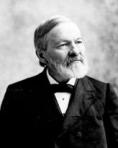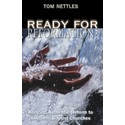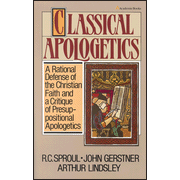Archive
The scriptures teach that immersion is true baptism
 Chapter 2. The Teaching of Scripture.
Chapter 2. The Teaching of Scripture.
What, then, do the Scriptures teach as to the action which constitutes baptism? Everyone should try to decide this question for himself. It is the duty of Christian people to settle every religious question, if possible, by their own personal examination of Scripture. Luther contended for the right of private judgment; is there not a corresponding duty of private judgment?
A plain man of average intelligence has become a believer in Christ, and knows that he ought to be baptized. He knows, also, that there is a difference among Christians around him as to what is baptism – that three different actions are called baptism. He takes up his New Testament, to read in his own tongue, and to see if, as a matter of private judgment, he can determine what constitutes the baptism which his dear Saviour enjoined? What does he find? The word baptize is only borrowed into the English language, and for him does not determine anything, being used, he knows, by different persons in different senses. And he is not acquainted with Greek.
But he finds the record of our Lord’s own baptism; that it was in the river Jordan; that after his baptism he came up out of the water. Does some one feel like interrupting me here to say that, literally, it is “came up from the water” (Matt. 3:16)? I answer, that is true in Matthew; but in Mark, according to the correct Greek text, it is “out of” (Mark 1:10). And in Matthew, while the word “from” does not itself show that he had been in the water, it does not at all show that he had not; and the connection makes it so plain that he had, that the versions of Tyndale, Cranmer, Geneva, and King James all render “out of.” The expression is like “Let me cast out the mote from thine eye,” and the statement in Tobit that “a fish leaped up from the river and wished to devour the lad.” So our friend is not misled by his English Bible as to this expression.
He finds also that when John, after long baptizing in the Jordan, left it for another place, he went to Aenon, “because there was much water there” (John 3:23). In reading Acts, he finds that when Philip was about to baptize the eunuch they went down into the water (Acts 8:38-9), and after the baptism they came up out of the water. In reading Romans 6:4, he finds the apostle likening baptism to a burial, and arguing that believers must not and cannot continue in sin that grace may abound, seeing that their very baptism, at the beginning of their Christian course, had reference to the death of Christ, and they were buried with Christ by baptism unto death, in order that, as Christ was raised from the dead, even so they also might live a new life.
Now, what can this man conclude but one thing? Pardon a homely story. The summer after the battle of Gettysburg I was preaching in a brigade at the camp below Orange Court House, during the great and blessed revival in Lee’s army. Many soldiers were finding Christian hope. After I had preached one day in an old church near the camp, a Presbyterian chaplain arose, called up several soldiers, and proceeded to “baptize” them, as he termed it, from a little bowl of water. When the services were about to close, a Baptist chaplain invited the congregation to go, after dismission, to a baptistery which had been prepared at the foot of the hill, where the ordinance of baptism would be administered. He handed me his Bible as we went down the hill, asking me to read some passages and pray. I read the account of the baptism of Jesus, the commission in which he enjoins baptism, the account of Philip and the eunuch, and the passage in Romans, and then many soldiers were baptized.
As the crowd went away, a soldier said to the chaplain: “I tell you what, parson; this that you did down here was a great deal more like them Scriptures than what they did up yonder.” Can anybody wonder that he thought so? Would not this be the general verdict of plain men, if they would just look on and consider? And the soldier of my story, though he had been sprinkled in infancy, never rested till he was baptized “like them Scriptures.” If any one should say that this was but an ignorant man, I will add that an Episcopal gentleman of high position and culture once said to me: “Anybody can see that immersion is baptism, and I grant that it takes a good deal of argument and explanation to show that something else is baptism too.”
Now remember that the Bible is a book for the people – given in order that the people may read, and learn, and judge for themselves. We who are called Protestants all contend for this; we are not afraid the people will be misled if they humbly and prayerfully search the Scriptures. It follows that the obvious teachings of Scripture – the ideas which lie plainly on its surface, so as to commend themselves to ordinary readers – are, to say the least, extremely apt to be what Scripture was meant to teach. We all insist much on this principle as regards the divinity of our Lord and the fact that he died to save us. So, here; the plain teaching of the English New Testament, to a plain man, who comes to it for information on this subject, will be that baptism is not a sprinkling or pouring, but an immersion.
John A. Broadus-Immersion Essential to Christian Baptism












Recent Comments